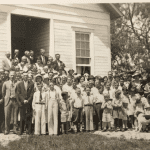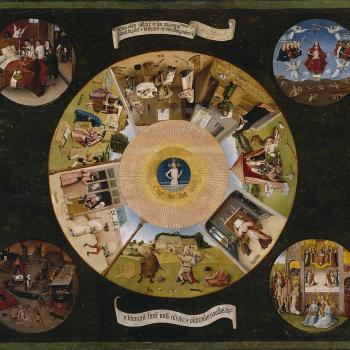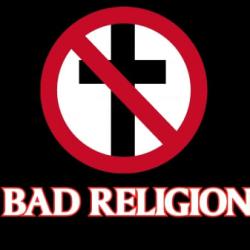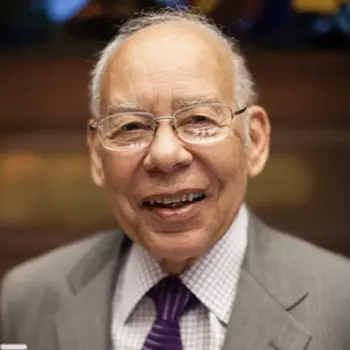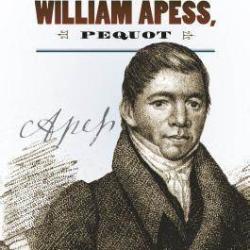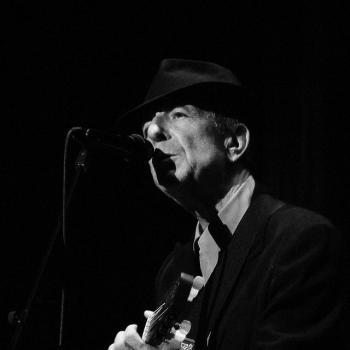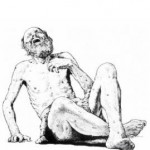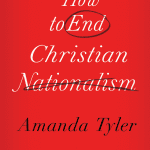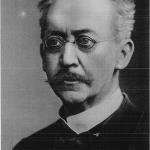“Unfortunately,” wrote historian Jemar Tisby last year for The Witness, “it seems that apart from an intentional effort otherwise, Black history is often lost in the mists of time.” So while he acknowledged objections to devoting a single month to the history of African Americans, Tisby continued to defend the tradition:
When we observe Black History Month, we give citizens of all races the opportunity to learn about a past and a people of which they may have little awareness.
It pains me to see people overlooking Black History Month because Black history (just like Hispanic, Asian, European, and Native history) belongs to all of us — black and white, men and women, young and old. The impact African Americans have made on this country is part of our collective consciousness. Contemplating Black history draws people of every race into the grand and diverse story of this nation.
Moreover, Tisby continued, Christians should study African American history this month because “God’s common and special grace even work themselves out in the providential movement of a particular race’s culture and history. We can look back on the brightest and darkest moments of our past and see God at work. He’s weaving an intricate tapestry of events that climax in the life, death, and resurrection of Jesus Christ.”
I’m not an expert on this field, so I’ll leave it to our Americanists to write in greater depth (as David did with his recent post on the dismaying history of racism at Southern Baptist Seminary). But I did want to share five books that I’m hoping to read for Black History Month, as part of my own continuing education as a Christian, an American, and a student of history.
Jemar Tisby, The Color of Compromise: The Truth about the American Church’s Complicity in Racism (Zondervan, 2019)
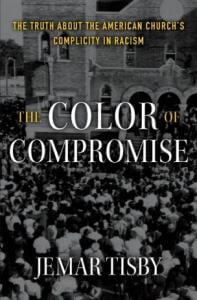 I’ll start with the newest of the group, which comes from Jemar Tisby himself. “Historically speaking,” he argues, “when faced with the choice between racism and equality, the American church has tended to practice a complicit Christianity rather than a courageous Christianity.” How can that tendency be changed? A fellow member of the Conference on Faith and History who is completing his doctorate at the University of Mississippi, Tisby argues for the role of the Christian historian as truth-teller: “History and Scripture teaches us that there can be no reconciliation without repentance. There can be no repentance without confession. And there can be no confession without truth.”
I’ll start with the newest of the group, which comes from Jemar Tisby himself. “Historically speaking,” he argues, “when faced with the choice between racism and equality, the American church has tended to practice a complicit Christianity rather than a courageous Christianity.” How can that tendency be changed? A fellow member of the Conference on Faith and History who is completing his doctorate at the University of Mississippi, Tisby argues for the role of the Christian historian as truth-teller: “History and Scripture teaches us that there can be no reconciliation without repentance. There can be no repentance without confession. And there can be no confession without truth.”
As the negative response from some Gospel Coalition readers to a generally positive review of Color of Compromise illustrates, these are not truths that white Christians are eager to hear. But in her own review, Atlantic writer Emma Green thinks that Tisby’s historical approach “offers white conservative Christians language for talking about racism in a way they can accept and understand. Tisby invites these readers to walk with him through America’s past, crafting a narrative that feels safely apolitical and can be understood with scholarly remove. As Tisby gets closer to the present, however, he shows that the sins of the past may not be so different from those of today.” She concludes that he “is the rare writer on race who could have impact in rooms where progressive consensus cannot be assumed.”
David W. Blight, Frederick Douglass: Prophet of Freedom (Simon & Schuster, 2018)
Perhaps the most highly anticipated history book of last year, Blight’s work has widely been hailed as the definitive biography of the abolitionist whom Blight suggests may be history’s “best example of an American radical patriot… the slave who became a lyrical prophet of freedom, natural rights, and human equality.” The word prophet points to an important theme in Blight’s account of Douglass, whose speaking career began in the AME Zion Church in New Bedford, Massachusetts and whose first memoir ended with an appendix famously contrasting “the pure, peaceable, and impartial Christianity of Christ” with “the corrupt, slaveholding, women-whipping, cradle-plundering, partial and hypocritical Christianity of this land.” Blight calls Douglass “a living prophet of an American destruction, exile, war for its existence, and redemption,” a man inspired by Jeremiah, Isaiah, and other prophets who actually “merits that lofty title himself.”
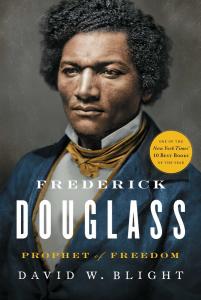 But in his review of Blight’s biography, New Yorker writer Adam Gopnik is struck by a less fiery moment later in Douglass’ career: when he sought out his dying former owner, Thomas Auld, and forgave him. To Gopnik, that encounter suggested Douglass’ faith in “the power of the Christian doctrine of forgiveness to penetrate a sensitive mind. For Douglass identified himself as a Christian throughout his life, and his gesture reminds us that slaves absorbed and reimagined the religion of their oppressors in their own morally original terms, as a permanent bulwark against persecution. Even during the reign of white terror that replaced the plantation concentration camps, the black church became the chief reservoir of social capital, and remained so right through Dr. King’s time—one more way in which Douglass’s life encompassed so much of what was to come.”
But in his review of Blight’s biography, New Yorker writer Adam Gopnik is struck by a less fiery moment later in Douglass’ career: when he sought out his dying former owner, Thomas Auld, and forgave him. To Gopnik, that encounter suggested Douglass’ faith in “the power of the Christian doctrine of forgiveness to penetrate a sensitive mind. For Douglass identified himself as a Christian throughout his life, and his gesture reminds us that slaves absorbed and reimagined the religion of their oppressors in their own morally original terms, as a permanent bulwark against persecution. Even during the reign of white terror that replaced the plantation concentration camps, the black church became the chief reservoir of social capital, and remained so right through Dr. King’s time—one more way in which Douglass’s life encompassed so much of what was to come.”
Reggie L. Williams, Bonhoeffer’s Black Jesus: Harlem Renaissance Theology and an Ethic of Resistance (Baylor University Press, 2014)
While its titular figure is a German theologian, Williams’ study is fundamentally about the black church — how its theology, molded by decades of cruelty and suffering, helped Dietrich Bonhoeffer reimagine a religion too often complicit in racism. “The fact,” writes Williams, “that well-meaning, intelligent Christians in Germany did not recognize the danger posed by the Nazis leaves one to wonder how the young Bonhoeffer, born, raised, and trained in theology with them, came to such a clear understanding of the problem so early, when the majority of his associates were fundamentally oblivious.” Why? Because his time in New York City let the young pastor learn from the theology of the Harlem Renaissance, which “identified Jesus with the oppressed rather than the oppressors.”
Karen J. Johnson, One in Christ: Chicago Catholics and the Quest for Interracial Justice (Oxford University Press, 2018)
What little I know about African American religion is largely confined to forms of Protestantism, so I’ve always wanted to read a book that centered the black Catholic experience. Cue recent Anxious Bench guest blogger Karen Johnson, whose new book considers a little known (to me, at least) dimension of the “long civil rights movement”: the Catholic activism that started with black priests and parishioners in the 1930s and grew into an intentionally interracial movement in the mid-1960s. It’s a particularly fascinating story because Johnson emphasizes the roles played by “women, who constitute the majority of the faithful and played significant, if underexplored roles, in the civil rights movement both inside and outside Catholic circles.” In the process, she uncovers “the fragility of the partnerships between white and black Catholics” and demonstrates “the difficulty of dismantling racial geographies and hierarchies.” These idealistic activists, she concludes, “[o]ften walked by faith, not by sight, hoping to see their church, city, and nation stand wholeheartedly on the side of interracial justice in their lifetimes… But in the end, they died without receiving that for which they had hoped.”
Michael G. Long and Chris Lamb, Jackie Robinson: A Spiritual Biography (Westminster John Know, 2017)
We’re just a week removed from the 100th birthday of the most important athlete in American history, so I’d certainly recommend Jackie Robinson’s autobiography (published the year he died, 1972, but still in print). The title of I Never Had It Made comes from the bracing, embittered lines that end the former Army officer’s preface:
The air was sparkling. The sunlight was warm. The band struck up the national anthem. The flag billowed in the wind. It should have been a glorious moment for me as the stirring words of the national anthem poured from the stands. Perhaps it was, but then again perhaps the anthem could be called the theme song for a drama called The Noble Experiment. Today as I look back on that opening game of my first world series, I must tell you that it was Mr. Rickey’s drama and that I was only a principal actor. As I write this twenty years later, I cannot stand and sing the anthem. I cannot salute the flag; I know that I am a black man in a white world. In 1972, in 1947, at my birth in 1919, I know that I never had it made.
That last chapter of Robinson’s life, when the retired player participated in the civil rights movement and grew disillusioned with the Republican Party, is surprising enough to people who know nothing but his trailblazing role in baseball history. I’m sure we’ll read that excerpt from his memoir in the new sports history course I’ll be teaching next year with a Bethel colleague. (To help think out loud about it, we’ve launched a weekly sports podcast.)
But because I could use more models for writing non-traditional spiritual biographies, I’ll instead plan to read about another lesser-known side of the Dodger great: his Christian faith. In a review for Christianity Today, our friend Paul Putz found Long and Lamb presenting Jackie Robinson as “a committed and thoughtful mainline Protestant comfortable within black and white Christian communities. Well versed in the Bible and connected to Protestant institutions throughout his life, Robinson saw faith as a source of inspiration, hope, and American identity.” But Paul was also struck by what they revealed about the role of his mother:
…Mallie taught Jackie to be proud of his God-given blackness. When telling the Genesis creation story to her children, Mallie depicted Adam and Eve as black-skinned, explaining that their skin turned pale after they sinned. Biographers have long noted that Jackie was proud to be black; from Lamb and Long we see that Mallie’s faith and the way she narrated biblical stories helped to shape that pride.



